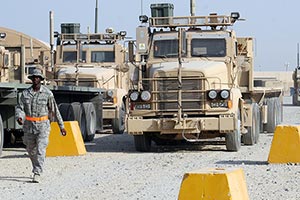Senior Reporter
Regulators Working on Pilot to Determine Safety of Young Military Truck Drivers

Federal trucking regulators say they are working on implementation of a congressionally mandated pilot program that will help determine if military truck drivers between the ages of 18 and 21 are as safe in interstate commerce as older professional drivers.
The Federal Motor Carrier Safety Administration pilot was a provision in the FAST Act signed into law in December. If young drivers prove to be as safe, the pilot has the potential to open the door for motor carriers to recruit younger drivers as a partial solution to the critical shortage of commercial motor vehicle drivers, industry and regulatory officials say.
Current regulations do not allow drivers to operate in interstate commerce until they are 21.
The pilot provision calls on the agency to convene a working group that consists of representatives of the armed forces, trucking industry, drivers, safety advocates, and state licensing and enforcement officials as the overseers of a study on the “feasibility, benefits and safety impacts” of allowing select young drivers to operate in interstate commerce.
There is no timeline on when the program must begin, but the agency is expected to make an announcement “later this spring,” FMCSA Deputy Administrator Daphne Jefferson said.
The law requires the agency to issue a report on the program one year after the pilot ends. FMCSA will be required to collect and analyze data related to the drivers’ accidents.
Those young drivers permitted to participate in the pilot include members or former members of the armed forces, reserve components and those otherwise qualified in a military occupational specialty to operate a CMV or similar vehicle.
Sean Garney, director of safety policy for American Trucking Associations, said ATA supports the pilot.
“We initially supported a broader pilot program that would have expanded the pool of possible drivers much further than just those in the military,” Garney said.
The broader provision, however, was not included in the final legislation that was passed and signed into law.
“It surprised most of the people that were close to the negotiations,” Garney said.
He added that the actual pool of former military drivers is limited since many of them are 21 or older after they are released from the armed forces.

